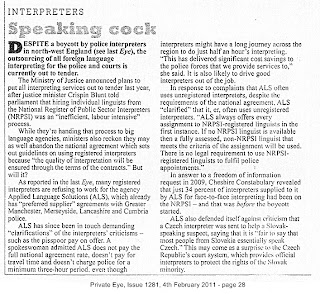Speaking cock
Despite a boycott by police interpreters in north-west England (see last Eye), the outsourcing of all foreign language interpreting for the police and courts is currently out to tender.
The Ministry of Justice announced plans to put all interpreting services out to tender last year, after justice minister Crispin Blunt told parliament that hiring individual linguists from the National Register of Public Sector Interpreters [sic.] (NRPSI) was an "inefficient, labour intensive" process.
While they're handing that process to big language agencies, ministers also reckon they may as well abandon the national agreement which sets out guidelines on using registered interpreters because "the quality of interpretation will be ensured through the terms of the contracts." But will it?
As reported in the last Eye, many registered interpreters are refusing to work for the agency Applied Language Solutions (ALS), which already has "preferred supplier" agreements with Greater Manchester, Merseyside, Lancashire and Cumbria police.
ALS has since been in touch demanding "clarifications" of the interpreters' criticisms - such as the pisspoor pay on offer. A spokeswoman admitted ALS does not pay the full national agreement rate, doesn't pay for travel time and doesn't charge police for a minimum three-hour period, even though interpreters might have a long journey across the region to do just half an hour's interpreting. "This has delivered significant cost savings to the police forces that we provide services to," she said. It is also likely to drive good interpreters out of the job.
In response to complaints that ALS often uses unregistered interpreters, despite the requirements of the national agreement, ALS "clarified" that it, er, often uses unregistered interpreters. "ALS always offers every assignment to NRPSI-registered linguists in the first instance. If no NRPSI linguist is available then a fully assessed, non-NRPSI linguist that meets the criteria of the assignment will be used. There is no legal requirement to use NRPSI-registered linguists to fulfil police appointments."
In answer to a freedom of information request in 2009, Cheshire Constabulary revealed that just 34 per cent of interpreters supplied to it by ALS for face-to-face interpreting had been on the NRPSI - and that was before the boycott started.
ALS also defended itself against criticism that a Czech interpreter was sent to help a Slovak-speaking suspect, saying that it is "fair to say that most people from Slovakia essentially speak Czech." This may come as a surprise to the Czech Republic's court system, which provides official interpreters to protect the rights of the Slovak minority.
Private Eye, issue 1281, 4th February 2011, Page 28 (In The Back).
No comments:
Post a Comment